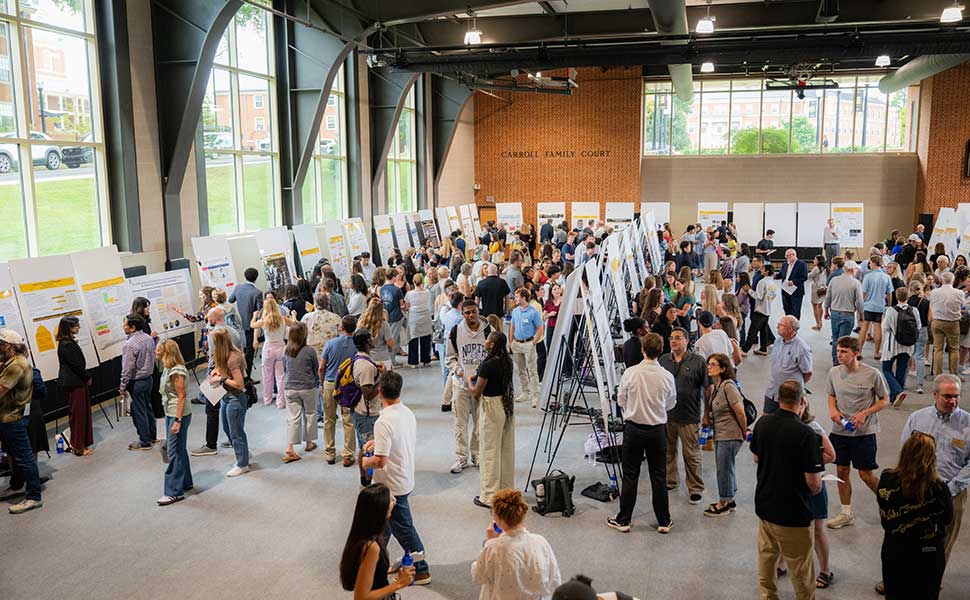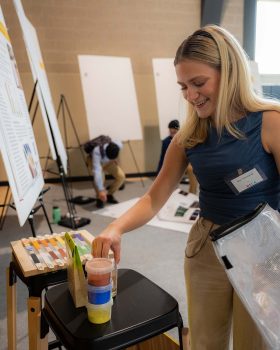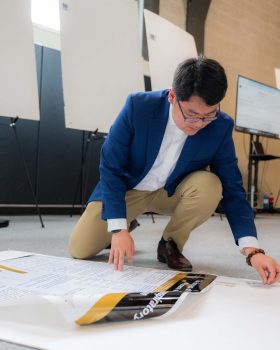URECA Day showcases student research
Event highlights undergraduate, faculty-mentor collaborations

Studio art major Blair Newsome wanted to find sustainable ways to reconcile the use of oil paint in art classes with ecological responsibility. She combined pigment powders with seed oils, plant-based solvents, and historical binders such as egg tempera as part of her research project.

“These materials, though slower to prepare, proved cost-effective, reusable, and environmentally low-impact,” said Newsome, who is earning a minor in environmental studies. “Packaging analysis further revealed that sustainable suppliers extend ecological values to distribution, in contrast with wasteful mass-market retailers.”
Newsome was one of more than 100 students from 30 disciplines who presented their recently completed and ongoing research projects in poster and oral presentations to hundreds of family, friends, faculty, staff and students during Wake Forest’s Family Weekend.
Grants from Wake Forest’s Undergraduate Research and Creative Activities Center (URECA) funded the mentored research projects.
“URECA Day is a celebration of the collaborative efforts between our faculty and students across the entire campus,” said URECA director Wayne Pratt. “It demonstrates Wake Forest’s commitment to making students active partners in scholarly discovery and expression.”
URECA Day showcases the amazing work that emerges when students and faculty work together to ask new questions and pursue new ideas.
URECA Director Wayne Pratt
Recent studies have shown that cardiorespiratory fitness may help prevent cognitive function decline with aging. Inspired by his grandmother, who has been diagnosed with Alzheimer’s disease, Health and Exercise Science major Steven Sun collaborated with two faculty mentors – gerontology and geriatrics professor Christina Hugenschmidt and HES professor Jason Fanning.

With only a limited number of studies looking at cardiorespiratory fitness in dance-related trials, Sun was curious about the heart rate intensity of different dance forms. His study results showed that the tango got the heart beating faster than both African and Classical dance. “Dancing is magical,” said Sun, who is planning to go to dental school. “Every part of the body is interconnected.”
Obsessive-compulsive disorder affects more than three million people in the US, and research suggests that approximately 50% of all cases have their onset in childhood and adolescence. Could parenting style have a role in OCD development in children?
Psychology major Elizabeth Beasley wanted to explore this idea. She and her mentor, psychology professor Veronica Cole, are using data from the Adolescent Brain Cognitive Development Study, the largest long-term study of brain development and child health in the US, to see if there may be answers. Their research is ongoing. “We are looking at whether overprotective parenting, compared to non-overprotective parenting, changes the strength of the link between behavioral inhibition and OCD symptoms,” Beasley said.
The undergraduate research experience through URECA often extends beyond Family Weekend. Some students continue to work with a faculty mentor, attend conferences to present research with their mentors or become co-authors on research papers.
Approximately one out of every 12 undergraduate students crossing the stage at commencement in 2026 will have had an opportunity to present at an Undergraduate Research Day during their time at Wake Forest.
Learn more about the 2025 student researchers in this guidebook, their work with faculty mentors, and check out the videos and photo story below.
- Ashley Li is exploring the ethics of AI-generated art, deepfakes and digital technologies with philosophy professor Tobias Flattery.
- How can honeybees help us understand the brain? Naoki Nikora is conducting research on learning, memory and brain function with biology professor Susan Fahrbach.
- How can muscle power and fitness improve healthy aging? Ava Johnson is conducting research with health and exercise science professor Paige Rice to find out.
- Chris Cha is researching model server strategies for generative AI and cloud computing with math professor John Gemmer.
- To view the photo story “Minds in Motion,” click here.



